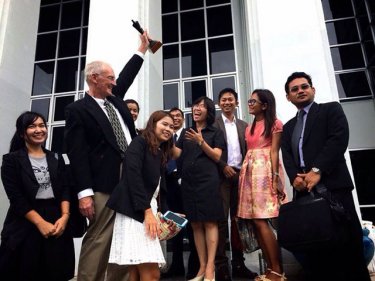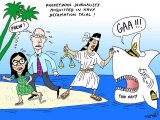PHUKET: It is worth reviewing the court ruling last week on the Phuketwan defamation case as an important milestone in the struggle for both press freedom and freedom of expression in Thailand and beyond.
First, the acquittal of the three defendants in the Phuketwan defamation case highlights the constant threat of defamation that journalists have to face at work.
Second, in stating that the 2007 Computer Crimes Act (CCA) should not be used to prosecute defamation, the ruling carries important implications for similar cases filed under the law.
The lawsuit responded to a news article published on the news website on 17 July 2013 headlined, 'Thai Military Profiting from Trade in Boatpeople, Says Special Report.' Charges were filed under both the Penal Code and the CCA.
Defamation
IN THE landmark ruling, the Phuket Provincial Court acquitted the three defendants - the editor, a reporter and the website - because the information published was not false, as it was entirely based on the Reuters report.
In the complaint filed by state prosecutors on April 17, 2014, the Navy cited only one paragraph it alleged to be defamatory. That paragraph, republished word-for-word, said:
''The Thai naval forces usually earn about 2000 baht per Rohingya for spotting a boat or turning a blind eye, said the smuggler, who works in the southern Thai region of Phang Nga (north of Phuket) and deals directly with the navy and police.''
The court found them not guilty under Article 328 of the Penal Code because the information they published was entirely based on a reliable and widely circulated report by reputed international news agency.
Reuters, having stood by the contents of its Pulitzer prize-wining report - is presumed to have crossed-checked information before publishing it.
It is worth noting that the Navy did not file any case against Reuters as the source of the 'defamatory' paragraph.
Furthermore, the Judge said that the report could neither harm any particular person's reputation nor compromise national security.
Similar case
PHUKETWAN journalists were the first to be sued for defamation under CCA in connection with their news story.
Another online defamation lawsuit was later brought against an editor of Issara News, an investigative online news website in August last year.
Issara News reported a court ruling on a disciplinary action against the complainant, Direkrit Janekrobtham who was then Secretary General to the Office of Administrative Court.
In the Issara case, the criminal court ruled that the published report was not defamatory as it was not false information, but based on an honest fact and duty of journalism to provide good analysis of the issues.
Online Defamation
IMPORTANTLY for Thailand, the broader implication of the Phuketwan ruling that the 2007 Computer-related Crime Act (CCA) shall not be used to prosecute defamation should be a welcome relief from the long-time misuse of this law.
The Phuketwan ruling is the first recognition by a Thai court that online defamation is not a cyber crime under this flawed law, which is currently under review by the government.
In dismissing defamation lawsuits brought by the Royal Thai Navy against the Phuketwan news website, its editor and a reporter, the court established among others that the anti-cybercrime law was not intended to prosecute defamation by means of publication.
It said this crime is appropriately dealt with under Article 328 of the Thai Penal Code.
The controversial Section 14 (1) of the CCA says that any person who is involved with importing of forged or false data, in part or in whole, into a computer system ''in a manner that is likely to cause damage to a third party or the public'' could be punished with imprisonment of up to five years or a fine of up to 100,000 baht (about US$3000) or both.
In practice, the phrase ''to cause damage to a third party'' has been interpreted to include damaging people's reputation, and, hence, applied to prosecute online defamation.
During the Phuketwan trial in August, a defence legal expert told the court that Article 14 (1) was meant to prosecute forging of documents electronically, which prior to the CCA could not be addressed under any Thai law.
In addition to carrying stiffer penalties than offline criminal defamation, which carried 'only' up to two years of imprisonment, charges under the CCA could not be withdrawn by the victim for any reason.
This meant that those accused under the law could only escape jail if acquitted of the charge.
SEAPA has observed that, following years of protests by media and internet freedom advocates since the problematic law went into force, more individuals have been prosecuted for online defamation, including for lese majeste, than for electronic forgery as the law prescribed.
The worst cases of disproportionate punishment and undue process of law against three individuals convicted of lese majeste in conjunction with offenses committed under the CCA were the military court's verdicts in August this year, sentencing the three persons separately for 60, 56 and 50 years.
Moreover, the flawed law has increasingly been abused to target even legitimate criticism, including against critical news reports and exposes, especially with the rise of online media outlets.
For this reason the misuse of Section 14 (1) of CCA is seen to have stifled online free expression in Thailand.
The current amendment to the law, which is pending the approval by the Cabinet as of June 2015 has reworded the problematic Article 14 to specify that offenses under this article excluded online defamation.
However, the Article 14 (1) and (2) can still be invoked to curb free speech as the interpretation of ''false computer information that undermines national security and causes public panic'' and ''false computer information that is intended on committing crime related national security or terrorism'' remain vague and may be arbitrarily defined by the state authorities.
Especially, the penalty under this provision is between three-to-five-year imprison terms and, or, a fine up to 100,000 baht.
In closing, it is important to highlight the Phuketwan defendants faced criminal defamation and not merely simple defamation, which is also called libel in some countries.
For the record, SEAPA believes that defamation must be decriminalised, and this is part of our longer-term advocacies in the region.
SEAPA is hopeful that the Phuketwan ruling will raise the bar for the defence of media freedom and freedom of expression in Thailand, and perhaps throughout the region, based on truth and media professional conduct.
Original Report
http://www.seapa.org/?p=11317
About SEAPA
THE Southeast Asian Press Alliance is the only regional organisation focused on promoting and protecting press freedom and freedom of expression in Southeast Asia. Established as a non-profit organisation in November 1998, the alliance works to unite independent journalists and press-related organisations in the region into a force for free expression advocacy and mutual protection.
First, the acquittal of the three defendants in the Phuketwan defamation case highlights the constant threat of defamation that journalists have to face at work.
Second, in stating that the 2007 Computer Crimes Act (CCA) should not be used to prosecute defamation, the ruling carries important implications for similar cases filed under the law.
The lawsuit responded to a news article published on the news website on 17 July 2013 headlined, 'Thai Military Profiting from Trade in Boatpeople, Says Special Report.' Charges were filed under both the Penal Code and the CCA.
Defamation
IN THE landmark ruling, the Phuket Provincial Court acquitted the three defendants - the editor, a reporter and the website - because the information published was not false, as it was entirely based on the Reuters report.
In the complaint filed by state prosecutors on April 17, 2014, the Navy cited only one paragraph it alleged to be defamatory. That paragraph, republished word-for-word, said:
''The Thai naval forces usually earn about 2000 baht per Rohingya for spotting a boat or turning a blind eye, said the smuggler, who works in the southern Thai region of Phang Nga (north of Phuket) and deals directly with the navy and police.''
The court found them not guilty under Article 328 of the Penal Code because the information they published was entirely based on a reliable and widely circulated report by reputed international news agency.
Reuters, having stood by the contents of its Pulitzer prize-wining report - is presumed to have crossed-checked information before publishing it.
It is worth noting that the Navy did not file any case against Reuters as the source of the 'defamatory' paragraph.
Furthermore, the Judge said that the report could neither harm any particular person's reputation nor compromise national security.
Similar case
PHUKETWAN journalists were the first to be sued for defamation under CCA in connection with their news story.
Another online defamation lawsuit was later brought against an editor of Issara News, an investigative online news website in August last year.
Issara News reported a court ruling on a disciplinary action against the complainant, Direkrit Janekrobtham who was then Secretary General to the Office of Administrative Court.
In the Issara case, the criminal court ruled that the published report was not defamatory as it was not false information, but based on an honest fact and duty of journalism to provide good analysis of the issues.
Online Defamation
IMPORTANTLY for Thailand, the broader implication of the Phuketwan ruling that the 2007 Computer-related Crime Act (CCA) shall not be used to prosecute defamation should be a welcome relief from the long-time misuse of this law.
The Phuketwan ruling is the first recognition by a Thai court that online defamation is not a cyber crime under this flawed law, which is currently under review by the government.
In dismissing defamation lawsuits brought by the Royal Thai Navy against the Phuketwan news website, its editor and a reporter, the court established among others that the anti-cybercrime law was not intended to prosecute defamation by means of publication.
It said this crime is appropriately dealt with under Article 328 of the Thai Penal Code.
The controversial Section 14 (1) of the CCA says that any person who is involved with importing of forged or false data, in part or in whole, into a computer system ''in a manner that is likely to cause damage to a third party or the public'' could be punished with imprisonment of up to five years or a fine of up to 100,000 baht (about US$3000) or both.
In practice, the phrase ''to cause damage to a third party'' has been interpreted to include damaging people's reputation, and, hence, applied to prosecute online defamation.
During the Phuketwan trial in August, a defence legal expert told the court that Article 14 (1) was meant to prosecute forging of documents electronically, which prior to the CCA could not be addressed under any Thai law.
In addition to carrying stiffer penalties than offline criminal defamation, which carried 'only' up to two years of imprisonment, charges under the CCA could not be withdrawn by the victim for any reason.
This meant that those accused under the law could only escape jail if acquitted of the charge.
SEAPA has observed that, following years of protests by media and internet freedom advocates since the problematic law went into force, more individuals have been prosecuted for online defamation, including for lese majeste, than for electronic forgery as the law prescribed.
The worst cases of disproportionate punishment and undue process of law against three individuals convicted of lese majeste in conjunction with offenses committed under the CCA were the military court's verdicts in August this year, sentencing the three persons separately for 60, 56 and 50 years.
Moreover, the flawed law has increasingly been abused to target even legitimate criticism, including against critical news reports and exposes, especially with the rise of online media outlets.
For this reason the misuse of Section 14 (1) of CCA is seen to have stifled online free expression in Thailand.
The current amendment to the law, which is pending the approval by the Cabinet as of June 2015 has reworded the problematic Article 14 to specify that offenses under this article excluded online defamation.
However, the Article 14 (1) and (2) can still be invoked to curb free speech as the interpretation of ''false computer information that undermines national security and causes public panic'' and ''false computer information that is intended on committing crime related national security or terrorism'' remain vague and may be arbitrarily defined by the state authorities.
Especially, the penalty under this provision is between three-to-five-year imprison terms and, or, a fine up to 100,000 baht.
In closing, it is important to highlight the Phuketwan defendants faced criminal defamation and not merely simple defamation, which is also called libel in some countries.
For the record, SEAPA believes that defamation must be decriminalised, and this is part of our longer-term advocacies in the region.
SEAPA is hopeful that the Phuketwan ruling will raise the bar for the defence of media freedom and freedom of expression in Thailand, and perhaps throughout the region, based on truth and media professional conduct.
Original Report
http://www.seapa.org/?p=11317
About SEAPA
THE Southeast Asian Press Alliance is the only regional organisation focused on promoting and protecting press freedom and freedom of expression in Southeast Asia. Established as a non-profit organisation in November 1998, the alliance works to unite independent journalists and press-related organisations in the region into a force for free expression advocacy and mutual protection.


















